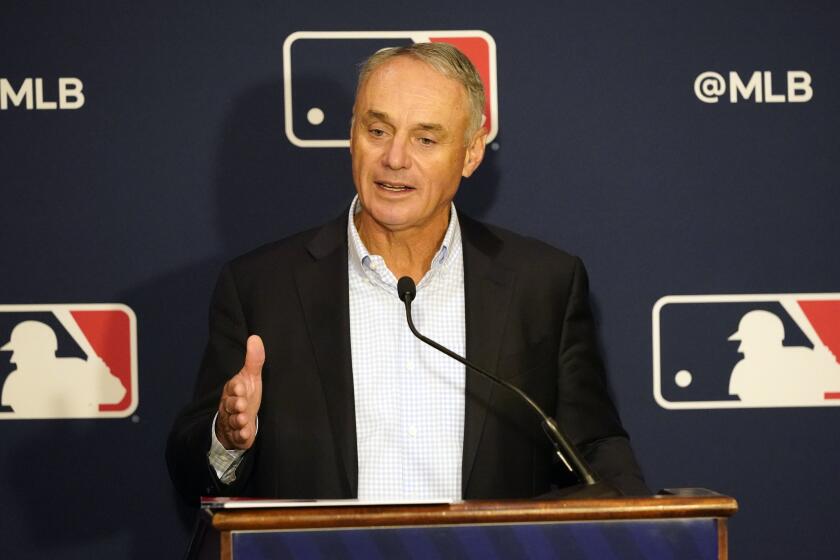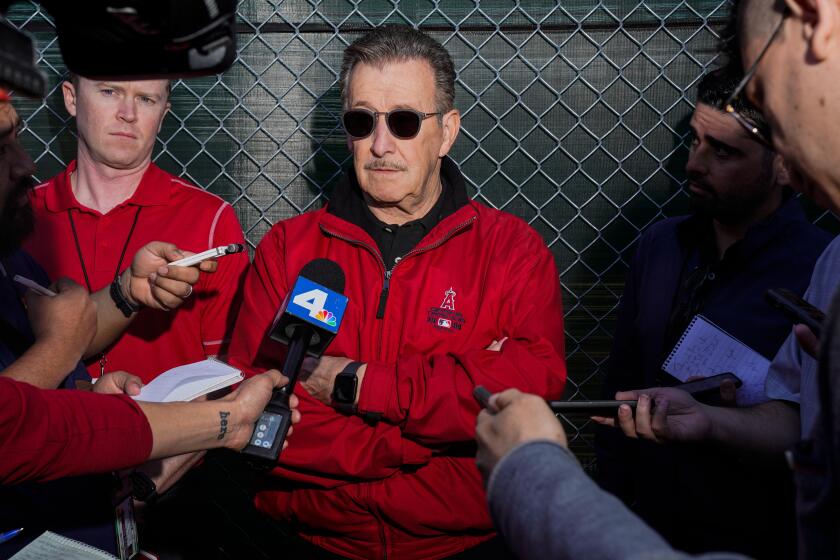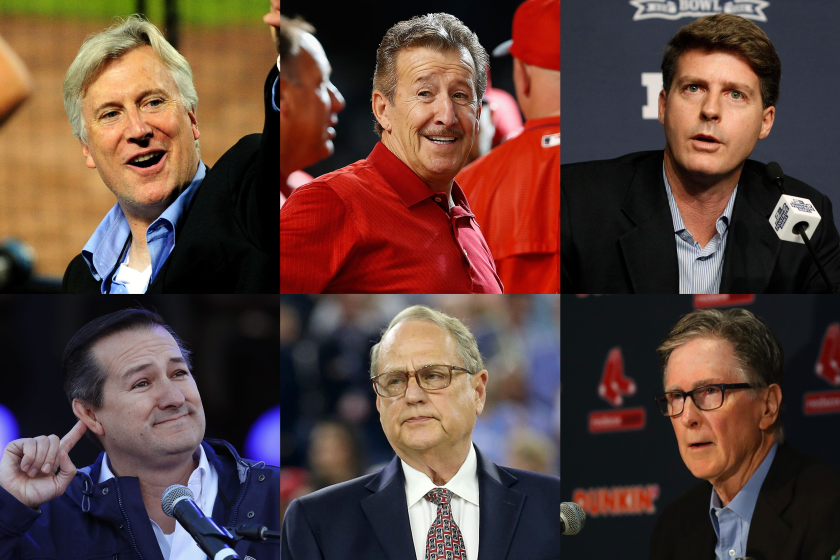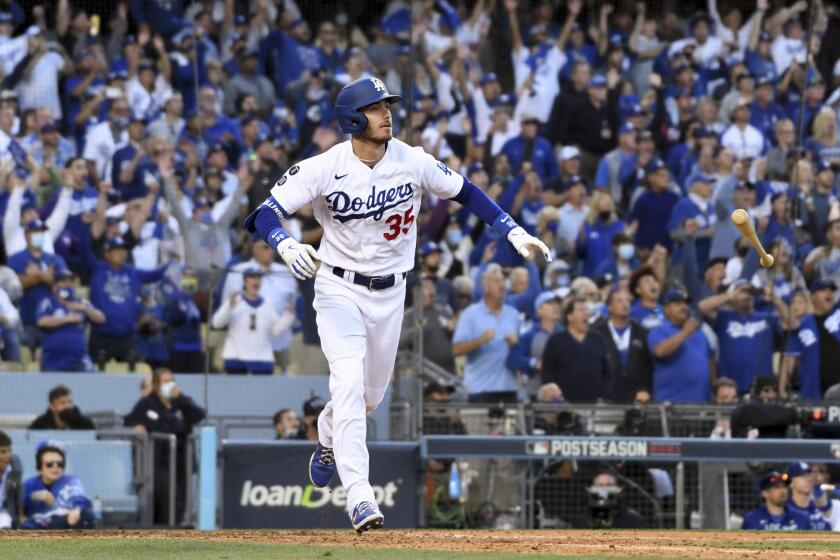MLB lockout takeaways: L.A. Times writers discuss owners, money and free agency
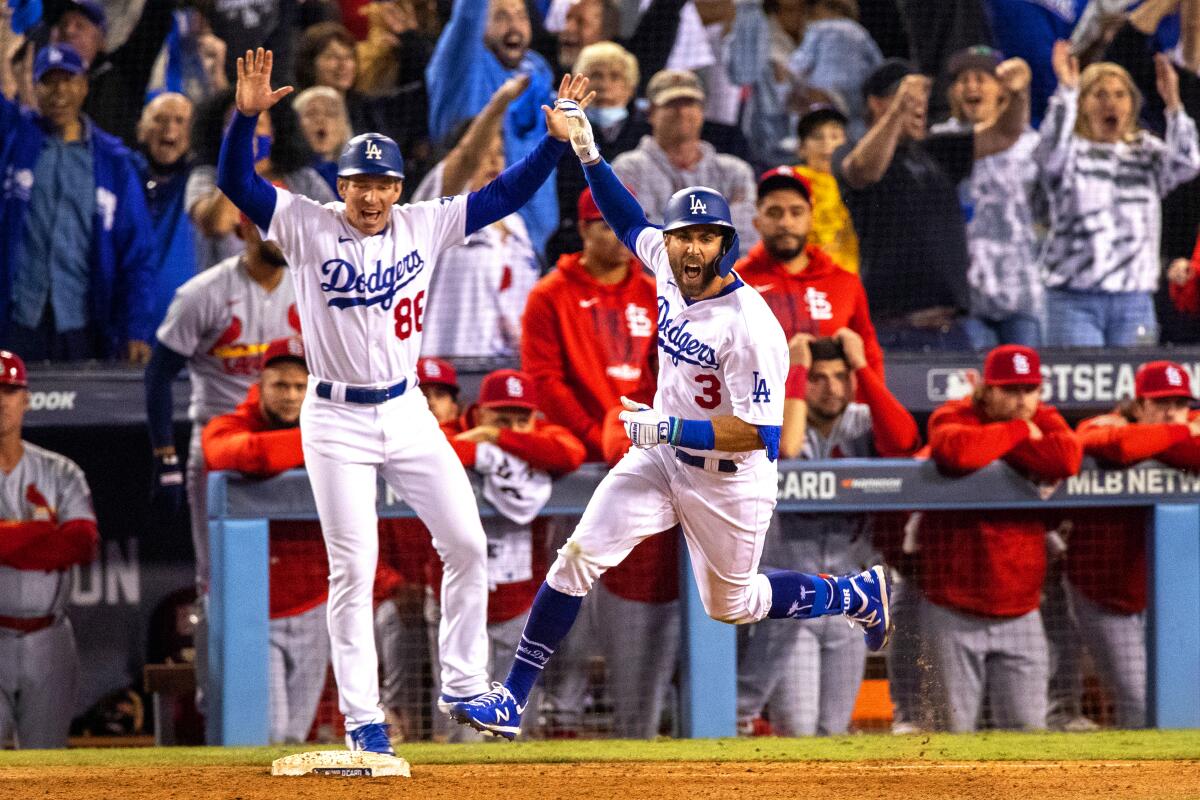
- Share via
Major League Baseball’s three-month lockout continued Monday, the day the league said an agreement on a new collective bargaining agreement needed to be reached. If not, MLB said, the season would not start as scheduled on March 31 and games would be canceled.
With so much uncertainty, Los Angeles Times writers Dylan Hernández, Bill Shaikin, Helene Elliott and Jack Harris held a Twitter chat Monday to share their thoughts. Hernández served as moderator. What follows is an edited version of the chat.
Hernández: “Bill, can you brief us on where we are on this thing, how close we are to losing games and how many games you think we’re going to lose?”
Shaikin: “The major league owners imposed the lockout in December. There’s no rule under labor law that says if a collective bargaining agreement expires, you have to proceed to a lockout. You can continue to negotiate under the terms of the old deal. The owners did not want to do that. And the reason they didn’t want to do that is because they fear that if they did that, and they didn’t reach a new deal by the spring, that then the players could decide to go out on strike. And that could be bad because the owners’ revenue comes from primarily television these days, and then later in the season, and certainly in the postseason, the more revenues [increase]. In 1994, when the players went out on strike, they did it in August, right before the postseason. So the owners imposed a lockdown and said, we’ll get it done this way. We’ll do it in the offseason.
“Well clearly, there’s no deal by now. And the owners, again unilaterally, decided that if there’s no deal by today, they’re going to start calling off regular season games. And for how long? We don’t know, if that happens. But clearly, the two sides have been negotiating all week, cooped up in Florida. They’re probably sick of each other by now. They’re probably gonna want to take a break. So I think if there is a delay to the season, it’s not going to be a day or two. It’s going to be a while.”
MLB commissioner Rob Manfred and baseball’s owners have done more to keep the players united than the union ever could.
Hernández: “A lot has been said about how unwatchable the game has become, the shifts in the game because of analytics and stuff. Both of these sides at the end of the day work in the same industry. Is there no concern over the well being of a sport, at this point? Or have the owners basically talked themselves into the corner where, you know, they almost have no choice but to kind of fight their way out of it?”
Shaikin: “I think the greater problem has been for the past few labor negotiations, the owners have won and it wasn’t really close. And the owners have been able to exploit, legally and smartly, provisions in the collective bargaining agreement that allow them to make a lot of money and frankly run a baseball team at very little economic risk. And when Rob Manfred, the commissioner, came out a couple weeks ago, the last time he spoke publicly, and said [it’s] probably safer to actually have your money in the stock market than in ownership, I think the players were both amused and enraged. And of course, the Braves’ financial report came out — and the Braves are part of a publicly traded company, so they have to tell everybody how much money they made and how much money they spent — and in an era when Major League Baseball would like you to believe that between paying players and the rest of our other expenses, it’s about a 50/50 [revenue split between owners and players], in reality the Braves, who won the World Series, spent 28% of their revenue on players. And that’s an embarrassment.”
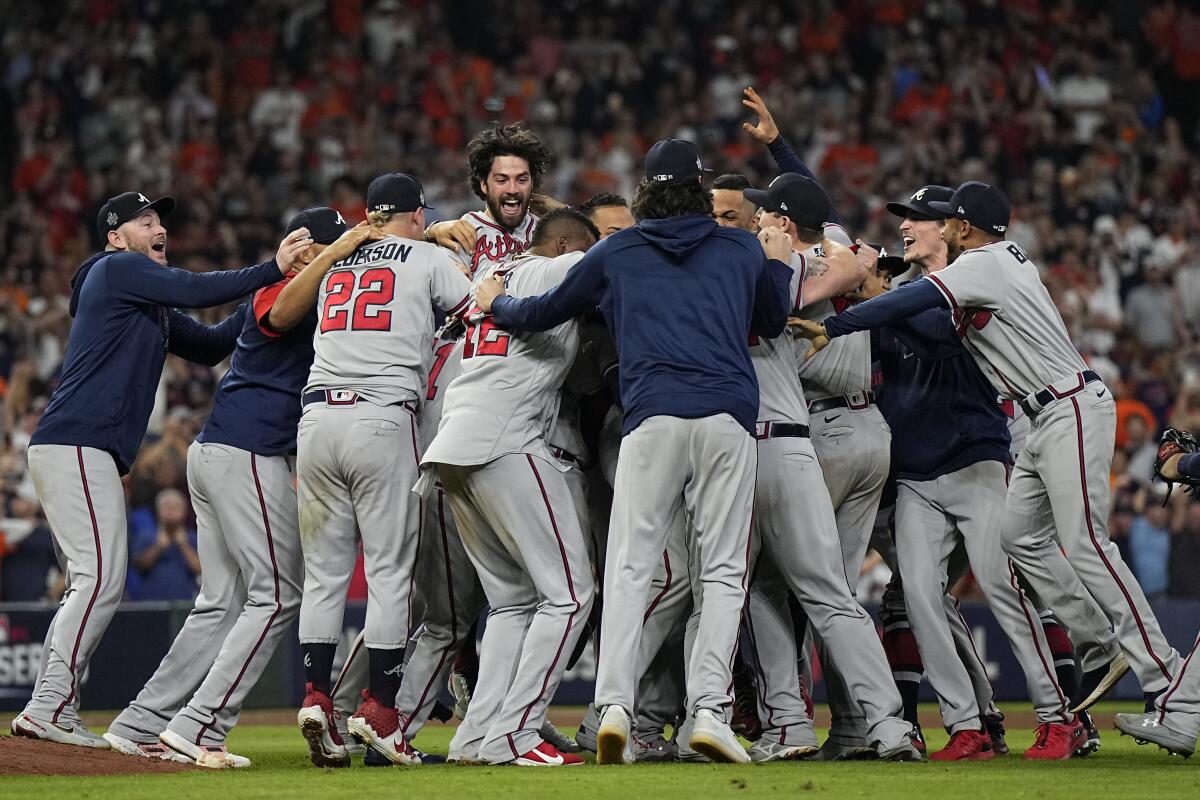
Hernández: “Here’s what I don’t get. A lot of these ballparks are now part of bigger developments. In the case of the San Francisco Giants, they own a lot of the real estate around the ballpark. There are gambling avenues that are going to be opening up. We heard about the [Baseball Advanced Media] sale, their multimedia property that they sold for billions. So, isn’t there enough money to go around?”
Shaikin: “There’s more than enough money to go around. You’ve got a system, frankly, where, look at what the owners have done: They’ve pretty much insulated themselves from a lot of risks; the term is ‘cost-certainty.’ So, if you look at free agency, one of the issues that is probably among the most prominent left to be resolved is how much can an owner spend in free agency? And because there’s no salary cap in baseball, as opposed to most other major sports, the owners have been able to get a luxury tax system. You can spend what you want if you’re the Dodgers, but if you spend above a certain amount, we’re going to give you a financial penalty. And the owners would like to make those financial penalties stronger to satisfy the Pirates and the Marlins and the Royals and all the other teams that worry about how much the Dodgers and the Yankees and Cubs spend. That’s one area of cost-certainty.
“In arbitration, the players want to have more eligibility for arbitration. The owners are like, ‘Oh no, no, no. A third party deciding salaries? We don’t want any more part of that than we already have. Minor leaguers, we’re gonna cut minor league jobs. Drafts, we’re gonna limit how much you can pay players.’ I mean, there’s really not a whole lot of risk, frankly, in my mind, to running a major league team at this point. And the owners kind of like it the way it is.”
Hernández: “I’m a worst-case scenario guy. If you had listened to me, there was gonna be no baseball in 2020. There would have been no Tokyo Olympics. That was wrong on both counts. But, I want to ask Helene here, who obviously in addition to covering baseball has also covered the NHL extensively, there was a work stoppage that led to a season getting wiped out. And I just want to ask, how did the NHL get to that point? And do you see any similarities maybe between that one and this one, where there might be the risk of there being no baseball this year?”
Elliott: “Yeah, I’ve had the misfortune of covering three NHL lockouts. In ‘94-95, it shortened the season to 48 games. The entire 2004-05 season was wiped out. And then the 2012-13 season was shortened, which was the one where after the Kings had won the Stanley Cup … There’s some similarities in terms of, owners will throw up their hands and complain about costs. They don’t mention all those nice revenues that are coming in. Obviously, baseball is in a much better financial situation than the NHL is. Baseball has the big media contracts with the different TV networks that the NHL doesn’t have, and at levels the NHL doesn’t.
“In all these work stoppages, all these lockouts and strikes, it’s important to note that this one is a lockout. The players aren’t doing this, the owners are imposing the lockout here. There’s a certain amount of posturing: ‘We can’t go on. We can’t compete. The smaller-market teams won’t be able to compete unless we do this.’ All this back-and-forth thing. I think human nature is to require a deadline, a firm deadline. I remember one of the NHL lockouts, [it took until] the final, final, final deadline for a settlement to be reached to save some part of the season. And that’s just human nature.
“I think that we’re a ways away from that point in baseball. I think the sense is that spring training is so long anyway, I don’t think anybody will mourn, and certainly the players won’t mourn too much, if part of spring training is condensed. It isn’t like it was years ago, when players came to spring training to get in shape. They’re all in shape year round. And a lot of them I think, maybe a week, 10 days, tops two weeks of spring training and that would be enough. It wouldn’t break my heart if baseball started April 15 or so. I think starting in March is ridiculous anyway, particularly in cold weather cities. And I would expect there to be a lot of back and forth before anything even remotely gets done.”
Hernández: “Jack, the Dodgers have obviously a lot at stake here in terms of, they’re going to host an already-postponed All-Star game. What does this mean for them if this drags on to the point where they have to cancel it or postpone it again?”
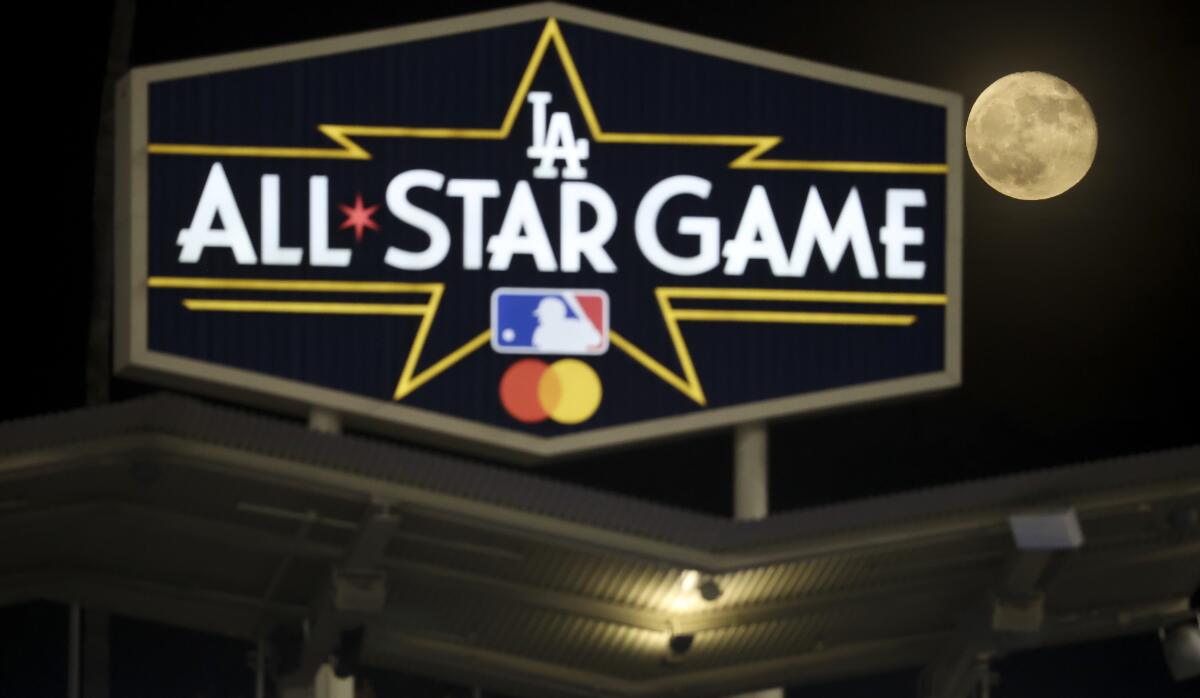
Harris: “There’s obviously a lot of layers to the Dodgers specifically, with the idea of losing a lot of the season. I’ll start with the All-Star game, which you mentioned, which is something that definitely isn’t back of mind right now. I know there’s already a lot of planning underway within the club to try to figure out where events will happen and what that week will look like. And obviously, the whole All-Star festivities were supposed to be a way to unveil the improvements and renovations they’ve made at Dodger Stadium. So the fact that, after [it was postponed by the pandemic] in 2020, it’s sort of getting potentially endangered again, figures.
“As far as the team is concerned, I think in some ways, a team like the Dodgers is less affected by the potentiality of losing games. It’s a team that, even during the regular season, as much as they’re trying to win games obviously, is also trying to perfect itself for October and get the roster right. So I think especially when you add in some of the injured players they have coming into the year, whether it’s giving Max Muncy more time to rehab or someone like Dustin May time to come back from Tommy John [surgery], I don’t think losing a few games up front changes a lot about how they actually perform on the field.
The Kennedy Commission, an Irvine-based housing advocacy group, warned the city of Anaheim that its proposed Angel Stadium sale would violate the law.
“I think the biggest detriment is, the Dodgers have had so much success in recent years bringing in either players from the outside or players already in their system, and using the offseason, spring training, the early parts of a season to develop their players. And I think you look at the team this year with somebody like Andrew Heaney, somebody like Tony Gonsolin, some of the young pitchers in the bullpen, they’re missing what has in the past been valuable time for the club to work with its pitchers and some of its other players, and try to develop them and improve them over the course of the year. So I think that’s probably one of the things that the Dodgers specifically are missing out the most.”
Hernández: “One thing that’s puzzling to me, too, is the entire no-contact thing right now between management and the players. I know medical staffs, for example, have been told to not talk to the players at all. The guys that are rehabbing are on their own right now, which to me seems very counterproductive here.
“Shaik, obviously, we’ve seen situations too where they’ve scrubbed the players off the websites and stuff, even though they’re basically making their merchandise invisible [because] the players are the product here. It almost feels like one of those ‘cutting off your nose to spite your face’ [situations]. How do you view this in terms of how much damage these owners of these franchises are doing to themselves here?”
Shaikin: “You made a great point about the no contact between anybody working for a team and any of the players, because health-wise it’s going to be huge. Now we’re going to end up with a shortened spring training, whatever it turns out to be. You’re going to want guys to get ready for the season a little bit quicker than they otherwise might. And you don’t have any idea of what shape they’re in. You don’t have any idea of not only what rehab program you need to prescribe for them, but really, in a sense, what your personnel needs are. Because a guy coming off an injury might be ready to go, or you might think he might be ready to go, but he’s not. And you’re not going to know that until you get into camp, and all of a sudden you got to rustle up somebody to replace them.
“I guess on the flip side, there are 200 free agents sitting out there waiting for some sort of offers, so there’ll be a market. But it does not seem like a great way to run a league. And as you pointed out, it certainly doesn’t do much for protecting the game or interest from fans. Because all those Christmas ticket packages that you could have sold, you could have sold them by promoting all the new players you got, but you couldn’t sign any of them because there was a lockout. All those spring training trips that everybody romanticizes about, afternoons at the ballpark sitting in the sun, downing a beer or a Coke depending on how old you are, going out to dinner after — that’s all wiped out. You got whole economies in the Phoenix area that spent combined hundreds of millions of dollars on spring training facilities for the benefit of these tourism arrangements that now are not going to happen.”
A team-by-team look at the billionaire MLB team owners who are behind the lockout that could delay the start of the 2022 season.
Hernández: “Helene, it seems like a lot of times when there are labor disputes in sports, fans ultimately wind up kind of like siding with the owners, it seems. We saw a couple days ago, Walker Buehler tweeted out about how their wages haven’t kind of kept up with inflation and I think there was a pretty significant backlash there. I do feel like we’ve seen a shift in maybe the people that cover the game, where what I’ve read seems like the media might be a little bit more pro-labor. Do you think there’s been a shift in fans at all? And even if there has been, do these owners care enough about public opinion to let that affect how this whole thing goes?”
Elliott: “Owners don’t care about public opinion. It’s not family ownership anymore. It’s not like the O’Malleys owning the Dodgers and being in the community and hearing from unhappy fans every day. This is corporations. This is big investment companies owning major league teams now. So I think it’s different. I think the relationship is different with the community.
“I think it’s also important that whenever we write or whenever broadcasters broadcast about this, that it’s mentioned that this is an owner-imposed lockout. People get confused by that. You hear from people saying, ‘When the NHL players went on strike…’ No, they didn’t. It’s the owners who locked them out. And I think it’s part of our responsibility to make it clear where this is coming from.”
Hernández: “Jack, there are a lot of players unsigned all over the league. Clayton Kershaw is one of them. We’ve recently seen speculation maybe the Dodgers could be in on Freddie Freeman. What do you anticipate the free-agent market looking like in the days after the lockout ends?”
Harris: “Hectic, in a word. I think what’s interesting is that even for the players that were unsigned, going into the lockout, I think most of them probably had a pretty good grasp on what their markets were, which teams were interested and what their options were going to be coming out of the break. So how much some of that stuff changes is one of the things to look out for. I think you already kind of saw that a little bit with the news from Miami today that Derek Jeter was leaving reportedly over a change of philosophy and what they originally thought they might be able to do in free agency versus what they might actually do coming out of the lockout. So I think one of the early indicators will just be how different do teams’ plans and just the market in general, how different does that all look coming out of the lockout?
“For the Dodgers, there are going to definitely be some options for them — to both bring back some of the guys that you mentioned that have been with them who are free agents right now, like Clayton Kershaw or Kenley Jansen or Joe Kelly. I think Freddie Freeman, of the other big-name [free agents still unsigned], probably is the one that makes the most sense, in terms of fit for the lineup and what they need and where the price point will be. I think there’s also inevitably the factor of whatever the new luxury tax threshold looks like coming out of this, a team like the Dodgers, that’s going to directly impact [them] as they look at their long-term plans and try to figure out where they want or how they want to spread out their their payroll over the next couple seasons.”
Hernández: “If you guys were to guess, when does this lockout end? When do we have a new CBA? What day would you guys put on it?”
Shaikin: “Well, if things don’t resolve themselves today in a positive manner — and as I indicated, I think they’re all kind of sick of talking to one another every day this week — they’ll take a break. It’s all been dictated by the owners, frankly. The owners determined when there was going to be a lockout. The owners determined when there was going to be a so-called deadline for starting the season. So I guess whenever the owners decide that they’re ready to talk every day until this thing is done. But I think human nature says they’ll take a break, they’ll still want three to four weeks of spring training. So let’s say Memorial Day [May 30].”
Dodgers outfielder Cody Bellinger is pleased with his health and offseason routine as he prepares for the season while enjoying his newborn daughter.
Elliott: “This is being dictated by the owners. The pace is being dictated by the owners because they have the keys to the stadiums. You see all these wonderful dramatic videos and photos of locks on stadiums, and it’s kind of funny. But they do have the keys. When there starts to be some owners who break away from the main group, who start to say, ‘You know what, maybe we should be talking. Maybe we should be thinking about starting. Maybe this is going to hurt me more than it’ll hurt other teams.’ I think once you start to get groups of owners splintering away, you’ll see a little bit more urgency. And I would say May 1.”
Harris: “I think even if you’re being optimistic right now, you’re probably just hoping to see any sort of regular season baseball before the end of May. I think anything beyond that, you’re really looking at what’s going to feel like a really different kind of season, one that probably looks a lot more like 2020 in terms of just the way the schedule is set up and how much time is lost and the way it impacts what we see on the field. So I would hope that even after today, and depending on what the fallout is if games are canceled, I don’t think they cancel games and then a week from now are back together finding momentum toward the deal. So I think once we get past the point where opening day is moved, it’s probably going to take a significant chunk of time after that. So, yeah, Memorial Day sounds like a good sort of over-under to put it on right now.”
More to Read
Are you a true-blue fan?
Get our Dodgers Dugout newsletter for insights, news and much more.
You may occasionally receive promotional content from the Los Angeles Times.
